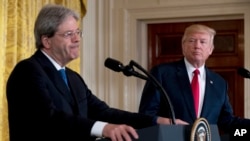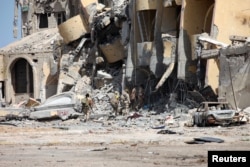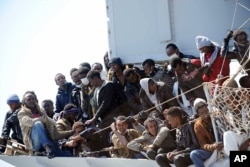Efforts to enlist more help from the United States in addressing Europe's migrant crisis appear to be falling short, with the Italian prime minister seemingly rebuffed during a joint news conference with U.S. President Donald Trump at the White House.
"I do not see a role in Libya," Trump told reporters Thursday when asked about doing more to stabilize the North African country, which has become a focal point for the migrant crisis. "I think the United States right now has enough roles."
"I do see a role in getting rid of ISIS," the president added, using an acronym for Islamic State. "I see that as a primary role, and that's what we're going to do whether it's in Iraq or in Libya, or anywhere else."
The answer is unlikely to satisfy Italian Prime Minister Paolo Gentiloni, who moments earlier called on the Trump administration to follow up its counterterrorism efforts with a political commitment.
"The U.S. role in this is very critical," Gentiloni said. "We need a stable and unified Libya."
Gentiloni's comments seemed to build on remarks he made earlier Thursday, when he described the need for Italian and U.S. action in Libya as "absolutely crucial." He said continued chaos could allow the Islamic State terror group to retrench, using it as a base to destabilize neighboring countries and launch more attacks against Europe.
"Stabilizing Libya is fundamental," Gentiloni said during a talk at the Center for Strategic and International Studies in Washington. "We can avoid [transforming] Libya into a new theater for competition of external powers, both regional and global, which is a risk."
Italy, in particular, sees Libya as a focal point for the migrant crisis, with 97 percent of the migrants who arrive on Italy's shores either originating from the country or using it as a transit point.
Last month, the Italian coast guard said the number of migrants saved in rescue operations this year had surpassed 15,000. Meanwhile, the last estimates by the United Nations refugee agency put the number of dead in 2017 alone at 440.
Prior to their meeting Thursday, Gentiloni said he planned to push Trump to keep the U.S. focused on Libya and the migrant crisis, both during the White House visit and again during next month's G7 Summit.
He warned that without more urgent action, Europe could be engulfed by what he described as "waves of chaos" from across the Mediterranean Sea.
"Too many Europeans have been living under the illusion that they could separate their destiny from the Mediterranean and from the crises originating from this region," Gentiloni said. "The task that governments have in Europe is to defeat smugglers and traffickers and manage the migration flow now, in the next months."
Gentiloni also urged the U.S. and other world powers to "Please keep Africa on top of our agenda," saying various conflicts and crises in sub-Saharan Africa have also helped fuel the migrant crisis.
"We can't consider Africa as the second Chinese continent," the Italian prime minister said, noting Beijing's ever-increasing role in providing aid and spurring development.
"We should do perhaps our part more strongly."






